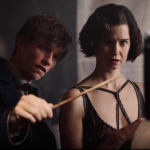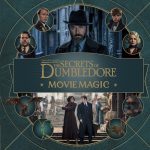Eddie and Katherine talk LUMOS, Feminism…and Mating Dances?

Nov 09, 2016
Fantastic Beasts, HP Cast, Movies, News, Redmayne, Redmayne Interviews
Katherine and Eddie stole into the room, and Katherine greets us with a cheery, “hello!” And then says, “wow, that was deceptively cheery. I’m not that cheery–hello!–I’m f—ing exhausted.” We all laugh, and begin commenting on Katherine’s two cups of coffee and bottles of water she brought in with her.
Katherine (picking up one coffee, and then the other): Yeah I need to–
Eddie: Make a choice, woman!
Katherine: This one is going to be good. This one is cold, but it’s good.
Eddie: Alright.
Other Interviewers: Make a drinking game out of it!
Eddie: Exactly!
Katherine: You know actually, this is something I learned in England. That they think that double fisting is a very pervy thing that sounds sexual. But here thats what we call it when you have two drinks, right. They call it double parked.
Everyone laughs as Eddie says, “yeah.”
Katherine: I was saying it on set and people were like ‘oh god’
Eddie: Don’t talk about double fisting wands. It won’t go over…
After a good laugh. An interviewer across the table brings everyone to focus with the first question, asking about the complexity of character and their role of saving children influenced how the two portrayed their roles. Eddie takes a sigh with “oh, man.” And the two take a second to contemplate an answer.
Eddie: Gosh, that’s interesting.
Katherine: Yeah that’s…nobody has asked that question.
Eddie: And the answer is, a lot of it came down to Ezra’s brilliance. He played quite awesome moments in the film in which you see the oscurist and some mass and noise and chaos, and Ezra would be there for us to play to. And he has that extraordinary capacity of wisdom to him, but also of finding his inner child and that bit of fragility, which I found riveting. Also, around the time I had been introduced, there was an article in the UK…about LUMOS, J.K. Rowling’s charity. And I had no idea about the institutionalization of children in countries in which orphanages still exist. It is something that I had been reading around, and felt, as J.K. Rowling manages to do, it felt in this huge, epic scale film, it felt very true.
Katherine: Yeah. I agree with all of that. And just to add it was–you know–one challenge you have in films is to invite the audience into a history that they’re not exactly privy to. Creedence and Tina have a past. He doesn’t remember it maybe, but she has been concerned about his for a while, before the film starts. That’s always a sort of scary challenge as an actor–there are no words to help tell this bit, and I don’t know how the audience will feel this connection, concern or bond. But then when I met Ezra, I was like ‘oh, it’s going to be fine.’ I just love this dude. So, like, I don’t have to think about this so much. I look at him and I care about him. That part of it sort of came naturally. That’s sorta to his credit.
Eddie: There is a sort of repression that is really interesting. There is a charity in Africa called Dramatic Need, in which they use drama, teaching drama, as a way for people who have suffered things at home that they can’t articulate–it’s through creating plays and telling stories that you are able to have a catharsis in it. And it’s sort of proven to be that way. But I think what was interesting about obscurist is that as the obscurist, the notion of repressing something can be unhealthy in that it can build and stir and cause a lot of damage. And I found that kind of intriguing.
After such serious discourse was brought to the table, the same interviewer tried to lighten the mood up. We all laughed, and Katherine told her that it was a great question. She asked if filming this movie made them hungry all the time, because there was so much food. We all burst out laughing.
Katherine: No! It wasn’t in the movie! The strudel wasn’t–oh wait, we actually did have a strudel on the table but it didn’t…You know, movie food stats to look sad pretty quickly (we all laugh). Five hours in, there’s flies.
Eddie: And worse. I don’t want to break your heart, but at the end, the amazing pastries that look like the animals, they’re made of foam. (we all laugh)
Katherine: You know, I did salivate when I saw those pastries.
Eddie: They looked so real, and I sat there salivating at the window. I went inside and picked one up, and was like ‘oh my god, it’s not even shoe pastry, dammit!’ (we are still all laughing…to the point it’s hard to hear)
The interview continued down the fun line of questioning, as the next interview asked Eddie what it was like to film the scene where he dances out a mating ritual. We all laughed loudly at his face, his reaction.
Katherine: We know it worked because everyone wants to know about it. (All laugh)
Eddie: I don’t know if they’re laughing at or with…
Katherine: No! With, with! Right? Guys, laughing with! (She laughs)
Eddie: One of the wonderful things about this script is that J.K. Rowling not only writes astonishing words, but the descriptions between were so detailed, and you kind of wanted to swim in those for a while. But that moment in the script, I’ve never seen her use fewer words. It just went “Newt performs mating dance.” (we all burst out laughing) I was just reading it, “oh and Newt performs mating dance” (Eddie makes a face) wait, WHAT?
Other Interviewer: Is this before or after you agreed to the film? (we all laugh)
Eddie: This was before I agreed. Some masochistic side to me, that I think was quite excited about making the scene.
Katherine: Also, before you have a job, you think everything is going to be possible. Then it’s after you think, “oh. Gosh. How am I going to do the mating dance?”
Eddie: I made a quick call to a woman called Alexandra Reynolds, who is a choreographer who I worked with on The Theory of Everything and The Danish Girl. And I was like ‘I need help on a mating dance.’ We went down a YouTube hole mating bird calls, and mating this and the other. And when it came to it, about once every few days, I would–I was going to say have a hard core drink but it was the middle of the day (all laugh)–Alex would film me doing the mating dance, and we’d send it to David Yates. There would be this absolutely horrific, four-hour period where I would wait for a reaction. Then a very serious reaction would come back, going like “I don’t know if it’s quite seductive enough. Not sure it’s quite there” (we all laugh over Eddie). So the answer is that it was a long process, and eventually we got to what you saw in the film…and there is about ten videos out there somewhere in the world that could end my career! (We all laugh)
Katherine: Yeah, she has a wealth of stuff on her phone. We all got to work with Alex–wand rehearsals, apparating practices-
Eddie: Oh my god, apparating practice was something else!
Katherine: It was so great to work with her on–but the thing that’s so great about is that she doesn’t butter you up. So she’s making a video of you doing something ridiculous and laughing out loud (we all laugh). I just can’t imagine what she’s got on her phone.
Another interview asked about Jo’s announcement of five films–did they know or did they “have to clear it with their people afterwards”?
Katherine (in a playful voice): Clear it with my people!
Everyone laughs.
Eddie (over dramatic) : Speak to my people!
Everyone laughs more.
Katherine: Well, we don’t know what’s going to happen. It depends whether or not anyone likes this one.
Eddie: Yeah.
Katherine: We’re –you know most actors are…you don’t really believe something’s real until you’re in the costume, on set, and maybe filmed a number of days where it would cost them too much to fire you (everyone laughs). It takes a lot. I mean we don’t really think of it like (in an airy voice) “oh so I’ll see you in 2019 for the fourth picture.” (all laughs) “I think I’ll stay on the west side of London that year.” We don’t think of it in those terms, really.
Eddie: The same point with what I loved about this script when I read it is sometimes, on big franchises, you feel like the first film is kind of like a pilot or a warm up into setting the state of affairs for the next film. And what I loved about this script–although it references back, it references forward–it sort of felt so whole in what it was. And I just found it had these elements of thriller, there was a darkness to it but there was a great comedy. And as all of the Potter films, heart. And I found at the end, when Dan’s character has to leave–AH SPOILER–but I though ‘oh god, whatever happens, I think this is a wonderful story I would love to be a part of.’ And as you say, people talk about the second film or the fifth…only if people enjoy this one. And if they do, what is lovely is Jo has written characters that have arcs, that have complication, and intricacies that are wonderful to discover. And we all get on–so far! (Everyone laughs)
Katherine: You can also tell she [Jo] is chomping at the bit. And we’re so curious to see where she’ll take it because of course they don’t tell us f—k all. (Everyone laughs) And so, we don’t know.
Another interviewer commented on how endearing Newt was throughout the film and asked how important that was for the character, for the audience as well. Katherine laughed.
Katherine (teasing, looking at Eddie): Yes, how hard was it for you to be endearing?
Eddie: You know what. This is actually true. One of the fears, one of the greatest fears of this film, was that I–David Yates and I spoke earlier about how prickly Newt is at the beginning. He’s not someone that you instantly like–he’s got edges…what was David’s word? He had a word to describe him. My fear, though, was 25 minutes in, when I’m walking along with Jacob, (Katherine begins to laugh) and I go “I was watching you at dinner and people seem to like you, Mr. Kowalski.” And he goes “I’m sure people like you too.” And I’m like “no, I annoy people.” (Everyone laughs).
And my just utter fear, was that Newt was massively irritating. So thank you for thinking he’s endearing. I love, ultimately what you have to commit to is the qualities in a character that Jo had written. And what she knew was that this person has a complete social awkwardness with other people, but has great heart and passion. Similarly, Tina’s character is misunderstood, as all of the quartette are. And yet they find in each other the qualities that make them grow as characters. And part of the theme of the film is just ‘don’t judge a book by it’s cover.’
The interviewer look at Katherine, and began discussing the time period of the film. At this point in the twenties women had begun to “came away from the skirt.” and began to wear trousers and branching out in occupations in the job world. The interviewer asked about how Katherine felt going back in time to play such a role–the start of women’s independence.
Katherine: Yeah, I thought a lot about my grandmothers when I was working on this. One of them was a secretary in New York and took the elevated trains– that are no longer in the city but are in our film–in from where she lived to the office as a secretary, where she worked. I thought about her, a young woman in New York, while we were working on this. And my other grandmother who was a total punk (we all laugh) and was a kind of pre-feminism feminist. She was an artist and was very independent minded, courageous, smart…it didn’t seem to me like, ‘oh it’s improbable that there were women like this back then.’ There have always been women like that, you now.
The reason why I’m really wearing trousers in the film is because Coleen Atwood pulled a few skirts for my first fitting, and I just didn’t see how–I don’t really know where it came from in my mind, I just thought she’s so practical, and this seems like a hard thing to run around the city investigating in. I think that’s how a lot of women ended up–with the fashion following the feminism in a way. If you had some kind of practical labor or work to do, and you couldn’t do it in a skirt, you put on the trousers, and it became…it started to represent something. A movement towards the same we’re still clawing away at, which is equal pay and rights and everything. But I think now, post the feminist movement, we have this idea that before it was all lousy for women, and I actually think there loads of very independent, smart, cool women working. Like Dorothy Parker, there were loads of women in the twenties who were writing and working in the mans world, getting by. It was cool to be at least a fictional representation of those times.
Eddie: But also interesting. When I was making The Danish Girl, I remember talking to Lana about the twenties. Referencing this film about coming back from the war, and that notion, certainly in Europe when the men went to war, and women took the male jobs, and suddenly the men came back and there was this moment…She described this moment of European architecture when there was art nouveau and the feminine shapes in architecture. As clothing became more androgynous I suppose, it was such an extraordinary moment in the twenties, before the fascists came and intentionally put masculinity back on top of it. It’s such an extraordinary period, that with the next film–if we do it–and we go to Paris, it will be interesting to see all that. It was an amazing time that decade.
With that the interview was done! Katherine and Eddie gave very long, in depth, insightful answers to a few good questions, and we hope to hear from them more on the red carpet!





